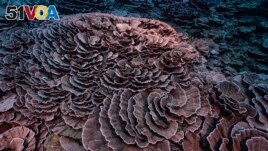23 January 2022
Researchers recently examined an unusual coral reef that was discovered near Tahiti in the South Pacific Ocean. The reef is thought to be one of the largest found at such depths and seems untouched by climate change or human activities.
Dive supported by UNESCO
The newly found reef stretches 3 kilometers. It was studied late last year during a dive supported by UNESCO. Unlike most of the world's mapped corals, which are found in shallow waters, this one was deeper — between 35 meters to 70 meters.

This photo provided by @alexis.rosenfeld shows corals shaped like roses in the waters off the coast of Tahiti of the French Polynesia in December 2021. (Alexis Rosenfeld/@alexis.rosenfeld via AP)
Such depths are difficult to explore. The deeper a diver goes underwater, the shorter the amount of time he or she can safely spend at each depth. The dive team had special air tanks and did 200 hours of diving to study the reef. The team took photographs, measurements and samples of the corals.
Corals are tiny animals that grow and form reefs in oceans around the world.
The reef is in a place where many researchers have not spent a lot of time, said Mark Eakin, formerly of the National Oceanic and Atmospheric Administration.
"We'll be seeing more of these discoveries as the technology is applied to these locations," said Eakin. "We may find some bigger ones somewhere, but I think this is always going to be an unusual reef."
Recreational dives and future research
Laetitia Hédouin said she first saw the corals months earlier with a local diving group that was on a recreational dive. Recreational is a term that means done for enjoyment.
"When I went there for the first time, I thought, 'Wow — we need to study that reef. There's something special about that reef," said Hédouin.
She is a researcher at the French National Center for Scientific Research in Moorea, French Polynesia.
Hédouin noticed that the corals looked healthy and did not appear to be affected by a bleaching event in 2019. A bleaching event is when corals lose their colors and turn white.
Around the world, coral reefs have been damaged from overfishing and pollution. Climate change is also hurting corals, including those in areas near the newly discovered reef.
Between 2009 and 2018, 14 percent of the world's corals were killed, says a 2020 report by the Global Coral Reef Monitoring Project.
The recent volcanic explosion in Tonga that created large waves across the Pacific has not affected the reef off Tahiti, said Hédouin.
Hédouin hopes the recent research can help experts understand why the reef has not been damaged by climate change and human activities. She also hopes scientists can better understand what part these deeper corals might play in the ocean. More dives are planned in the coming months.
Julian Barbière is the head of UNESCO's marine policy and regional coordination.
Barbière said, "We know very little about the ocean, and there's still so much that needs to be recorded, needs to be measured."
I'm John Russell.
Victoria Milko reported on this story for the Associated Press. John Russell adapted it for Learning English.
_____________________________________________________________
Words in This Story
coral reef – n. : a long line of coral that lies in the water – usually in warm, shallow water
shallow – adj. having a small distance to the bottom from the surface or highest point
location – n. a place or position
marine – adj. of or relating to the sea or the plants and animals that live in the sea